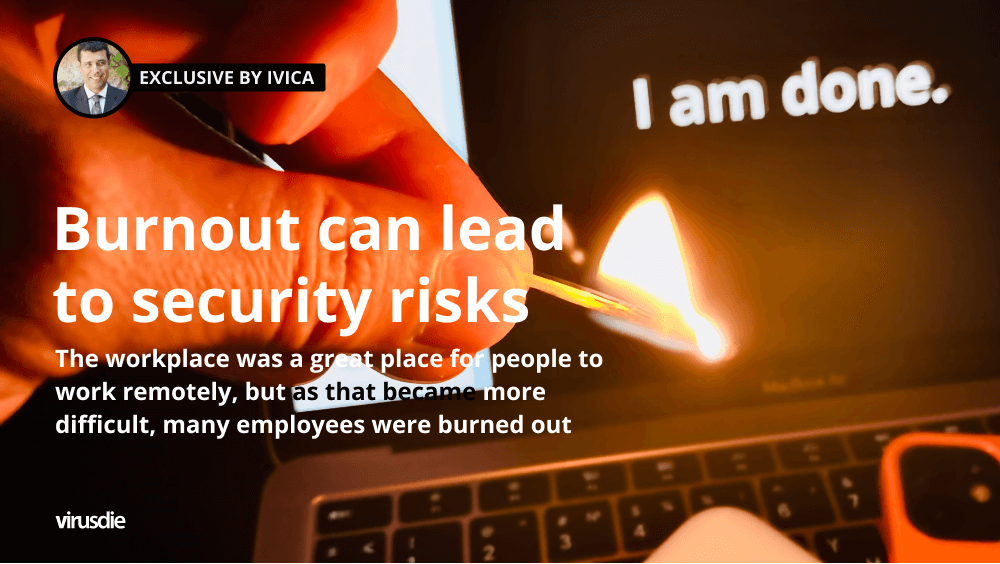
EXCLUSIVE | Burnout can lead to security risks. The workplace has changed a lot in the last two years, and Covid-19 was one of them.
The workplace was a great place for people to work remotely, but as that became more difficult, many employees were burned out. Now that work and life have merged, this burnout is even more apparent. It affects employees’ decisions and impacts the way they work. Most security experts agree that access controls are the most important aspect of an organization’s IT security strategy. However, they disagree on who should control access and why.
Companies are feeling the effects of employee burnout. More than ever, employees need to stay healthy, stay safe, and stay productive while working from home. For most of us, the job we have today is the one we will have for the rest of our careers. Understanding how the workplace is changing can help us be more successful and efficient.
If your employees are burned out, they will not follow safety guidelines
Work-related exhaustion is not a new phenomenon, but it has been exacerbated by Covid-19. When the virus is going to be finally eliminated, many companies will struggle to get back to normal. If companies do not address burnout before the pandemic ends, it will cost them dearly later.
The topic of today’s question: how much access does a user need to have to your company’s network?
Do you give users access to all systems or just the ones they need to do their jobs? Can you give limited or full access to all systems? Which systems should be accessible and which should not?
Try to think about these questions and make some answers.
84% of security professionals and 80% of other workers feel burned out.
57% of workers in the tech industry currently suffer from burnout.
Burned-out employees are one-third less likely to follow their company’s security policies (59% for burned-out vs. 80% for non-burned-out).
Burnout traps
Trap #1: Living for the future;
Trap #2: Loyalty to an organization;
Trap #3: Imposter syndrome;
Trap #4: Lack of work/life balance;
Trap #5: Fear of being fired;
Trap #6: Insecurity over a lack of technical skills or knowledge;
Trap #7: An urge to become a better employee.
Today’s cybercrime landscape is changing rapidly, and organizations must rise to the challenge.
Cybercriminals are becoming more sophisticated, and attacks have become more disruptive. Companies need to adapt and change their business practices accordingly. If you do not adapt, you will fall behind. Covid-19 has forced many companies to change the way they do business. The impact on business depends on the type of company and industry.
Why is it important to understand how Covid-19 will affect different businesses? How are different industries responding to the impact of Covid-19? Are there new cybersecurity issues caused by Covid-19? Can we put a price tag on lost productivity?
When companies face new challenges, we need to be ready. Covid-19 has caused many changes in the workplace, including new security issues.
Some important questions
– What do you do when someone leaves your organization?
– How do you keep them in line so they do not leave?
– How do you keep them from leaving and being a risk to your organization?
– How do you make sure they do not bring their bad habits into your organization?
– What do you do with people who have been fired for cause?
– How can you help them find a new job?
84% of safety professionals and 80% of other workers feel burned out. Burned-out employees are one-third less likely to adhere to company policies (59% for burned-out vs. 80% for non-burned-out).
They are more likely to ignore policies and procedures (78% of burned-out vs. 67% of non-burned-out).
In a study of cybersecurity employees, the most common reasons for quitting were burnout (25%), pay (20%), and lack of development opportunities (19%).
We need to change the way we think about cybersecurity careers and how to attract talents. The cybersecurity industry is aging and shrinking. This is creating a crisis where there is a shortage of people to do the work. The skills a cybersecurity professional needs are unique.
Human beings are not machines
We are limited in how much and how fast we can process information. We are limited by the amount of time we have in a day. If we took into account everything, we could pay attention to and perceive, we would never get anything done. The time we have in the day is limited. Add to the stresses of a global pandemic the distractions of social media, news and the constant hum of everyday life.
Most organizations struggle to account for and understand human behavior in increasingly decentralized workgroups. To do this, you need to change your understanding of risk and incorporate human performance into your risk assessment process. This means bringing human factors engineering, human systems integration, and interaction design experts into your safety teams and departments. Impact of cyber hygiene on system design is huge, you should consider is your company safe enough and what you can do to make it safer.
The question of safety is a question of the health of an organization. If you have noticed that your employees or colleagues are under increased stress, and we be  lieve that all of us are these days without exception, then it is time to do something.
lieve that all of us are these days without exception, then it is time to do something.
Reorganizing work, taking the pressure off employees, and better management are the first steps.
The second is no less important: implementing new smart tools that can protect you from security attacks.
Virusdie team could help you in this process. Virusdie offers you automatically clean up and protection of your websites from malware and vulnerabilities in seconds using the world’s most powerful and friendly all-in-one website security tool.
When it comes to safety, the worst thing you can think is that something bad will happen to someone else. The health care crisis has created enough problems. We cannot allow cybercrime to take over.
Think about human resource management and safety management of your business.
———
Article by Ivica Delic
founder of FreelancersTools,
exclusively for Virusdie.
Join our private Facebook group to get help from other security experts, and share your own web security experiences and expertise. Group members receive exclusive news and offers. They can also communicate directly with the Virusdie team. Join us on Facebook.

Comments